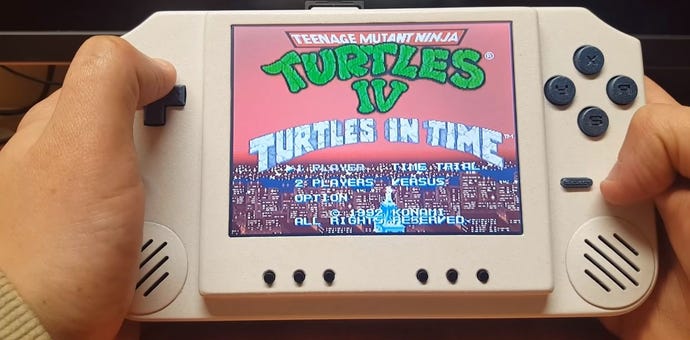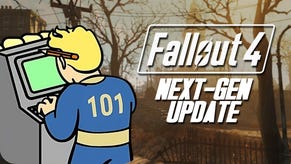How One Modder Builds Handheld Custom Consoles Through the Magic of Community and Self-Teaching
For modder Chris Downing, making his own handheld consoles is even more fun than playing them.
This article first appeared on USgamer, a partner publication of VG247. Some content, such as this article, has been migrated to VG247 for posterity after USgamer's closure - but it has not been edited or further vetted by the VG247 team.
Next time you have a few moments to stop and collect your thoughts, sit back and consider how valuable video games are as diverse learning tools. Games can ignite a person's interest in programming, or mathematics, or even art, writing, and music composition. The industry doesn't get near enough credit for the number of potential hobbies and careers a single console might inspire. Even the cold metal guts of a game system or a cartridge-based game might prompt a budding engineer to wonder, "How can I muck with this and shape it into something even cooler?"
Self-described "modest modder" Chris Downing taught himself how to modify and build game handhelds after performing some fateful repair work. While looking for online instructions on how to fix a loose N64 thumb stick, he stumbled on video of the "Darth 64," a sleek portable N64 by console modder Jonathan Wild. A light sparked in his mind, and he's since cobbled together some cool systems and enclosures with the help and support of the console modding community. He freely shares his creations and process on his YouTube channel and on his blog, Downing's Basement.
"I shudder to think what any real industrial or mechanical engineer with a formal education would think if they saw how some of these projects have been put together in the past," Downing tells me through an email interview. Despite his self-deprecating remark, most of his projects look good and function well.
If you're unsure what qualifies as a console mod, one of Downing's most recent creations, the SNES Box Go, might give you an idea. It's a handheld portable SNES that's powered by original hardware-specifically, the innards of the re-designed SNES released in 1997. The SNES Box Go doesn't have a cartridge slot, so it needs to load games from a flashcart, but the console's hardware isn't emulated. It's the real deal. Downing also designed an accompanying "breakout box" that allows for A/V output to a TV and a hookup for two-player game action. It's a cool piece of work that offers about 4.5 hours of battery life on a full charge, and it's all encased in a stylish shell (colored off-white in grand SNES tradition).
In addition to teaching himself how to engineer his own portable consoles, Downing had to teach himself how to design and 3D print cases that are functional and comfortable. "I didn't even get into 3D modeling until 2013 when it became necessary for a major project I had started," he says. "But I already had several years of portable making experience at that time and this was just the next step in advancing the portable-making process. As it stands now, it's the best skill I've learned."
It's easy to understand why learning how to design competent cases for portable systems would be a trial by fire. Nobody wants to hold an uncomfortable handheld for a long period of time-and if a handheld system can't adequately take your mind off the eight-hour flight you're stuck on, what's the point? "The balance between style and ergonomics of the shell is difficult. However, when you throw in designing for functionality as well, you've got a three-way power struggle with a very small 'sweet spot' where they all agree," Downing says.
Thankfully, big advancements in 3D printing across the past few years are making console modders' lives a little easier. "I'd say that five to six years ago, the thought process in building a case shell was based around the components you were able to acquire. Basically, now you can create your own components and then design your project around them. This single-handedly has been the biggest advancement in case design in the nearly 15-year existence of the hobby, and it's reflected in the quality of work that's come out in the past few years from the community."
In the end, console modding is all about community learning with a dash of wish fulfilment: Nintendo is almost certainly never going to release a portable SNES (the Game Boy Advance doesn't count despite its library of repurposed SNES games), especially one that utilizes original SNES hardware. That's primarily what drives fans to say, "Watch me do this" and take on the challenge for themselves.
Granted, making a little money on the side isn't objectionable. Downing does commissions for console mods, as well as commissions exclusively for cases. One of his most popular commissions is a case he built for a "portable Gamecube." It's a little less elegant than the SNES Box Go, demonstrating how far Downing come as a designer. It's still compact, functional, and quite cute.
Downing is also well-known for his portable N64 consoles, one of which was featured on the channel of popular YouTuber Max Mithzan. But his prototype of a console streaming device called The Cross Plane really generated some buzz, even if the Kickstarter for the project fizzled out at $20,000 USD of a requested $350,000 USD. "[The] Kickstarter had great intentions and a solid concept, but we just weren't far enough into the prototype development to make the idea really shine through," Downing says.
Interestingly, Downing doesn't play much in the way of modern handhelds. His family and full-time job limit the amount of time he has to work on his console mods, let alone leave any free time for gaming. "I have absolutely zero time for playing games if I'm working on a project," he says. "To be honest, the last 'new console' I bought was the PS2, and my most recent purchase on Steam was Doom 2016." His current project is another portable N64 he's making for the BitBuilt's summer 2019 contest.
But for Downing, the real fun of console modding isn't found in playing his creations. It's all about building systems, sharing, learning, and hoping newcomers are similarly inspired. When Downing started, he didn't have much beyond what he learned in his woodshop classes and some YouTube videos. "The amount of knowledge the community has gathered in the past years is what makes [console modding] possible at any skill level," he says.
If Downing was ultimately moved to enter the console modding community through the necessity of N64 controller repair, maybe we'll see a whole new generation of modders get inspired through Switch Joy-Con repair. Always look for that silver lining.












